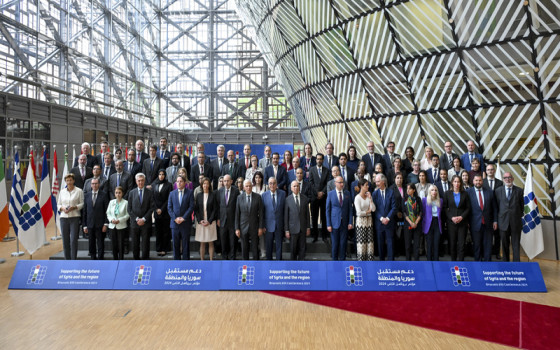
The European Union pledges 2.12 billion euros to support the future of Syria and the region.. United Nations: All trends regarding Syria are moving in the wrong direction

- Europe and Arabs
- Tuesday , 28 May 2024 12:15 PM GMT
Brussels: Europe and the Arabs
At the eighth session of the Brussels Conference on “Supporting the Future of Syria and the Region,” the European Union pledged €2.12 billion for the years 2024 and 2025. This assistance will support Syrians inside Syria and those in neighboring countries, as well as their host countries. Communities in Türkiye, Lebanon, Jordan and Iraq.
Yesterday's ministerial meeting, which included delegates from EU member states, Syria's neighboring countries, other partner states, donors and international organizations, including the United Nations, stressed the need for a political process in Syria in line with the UN Security Council resolution. The need to mobilize vital financial support to meet the most urgent needs of the Syrian people and their host communities.
The European Union reaffirmed the pledge it made at the 7th Brussels Conference of 2023 to 2024 (€560 million) for the population inside Syria, as well as for Syrian refugees and vulnerable host communities in Lebanon, Jordan and Iraq. The European Union also pledged to provide an additional amount of 560 million euros for the year 2025 to the above-mentioned countries. Furthermore, the European Union pledged €1 billion to support Syrian refugees and vulnerable host communities in Türkiye. Finally, the EU noted that the pledges for 2025 form part of the larger financial package until 2027, in line with the European Council conclusions of 1 February and 18 April 2024.
The European Union will continue to mobilize all tools at its disposal to support the Syrian people in reaching a negotiated political solution in line with UN Security Council Resolution 2254, and to create conditions for a brighter future for all Syrians.
The conference was preceded by online and in-country consultations with civil society organizations active in the Syrian crisis.
The ministerial meeting was based on the results of the “Dialogue Day” held on April 30. More than 600 participants in the “Day of Dialogue” - from Syrian civil society organizations from Syria, neighboring countries and diaspora; United nations; Member states of the European Union; Partner countries and international NGOs - views were exchanged during six thematic panel discussions, focusing on: the political process and UN Security Council Resolution 2254; early recovery and resilience; health and education; livelihood opportunities; The issue of missing persons and accountability.
The main points from the dialogue day were conveyed during the ministerial meeting by three rapporteurs from Syrian civil society.
Since 2011, the European Union and its Member States have been the largest donors of humanitarian and resilience assistance to Syria and the region, providing more than €33 billion in humanitarian, development, economic and stabilization assistance to date.
In the same context, the United Nations Special Envoy to Syria, Geir Pedersen, said that the suffering of the Syrian people is worsening after 13 years of war and conflict, while the levels of funding necessary to deal with the crisis have decreased to their lowest levels.
In his speech at the eighth annual Brussels conference on supporting the future of Syria and the region, Pedersen said that the pledges made by donors are essential to making a real change in the lives of millions of Syrians, two-thirds of whom need assistance.
The Special Envoy expressed his concern that all trends regarding Syria are moving in the wrong direction, as the country remains tragically fragmented in light of the ongoing war, in addition to the direct effects of the war in Gaza. He added that the economic situation had deteriorated and humanitarian needs had risen to unprecedented levels, and called for immediate calm and a nationwide ceasefire.
He added: “Syrian refugees are caught between increasing pressure and discontent in host countries, and a lack of confidence that the real protection and livelihood concerns they cite about returning to Syria are not being adequately addressed.” He stressed the urgent need to make progress on the political track. He stressed that no single party can determine the outcome of the Syrian conflict, pointing to the importance of cooperation between the Syrian parties and international bodies.
He added: “Although the importance of de-escalation and humanitarian assistance cannot be underestimated, a strategy of containment and mitigation will not stabilize the dangerous and unpredictable situation in Syria - just as it has not happened anywhere else in the region. This, to me, is a message.” Fundamental: Deep and complex conflicts cannot simply be managed or contained forever – there must be a political horizon for resolving the conflict.”
He said that resuming the work of the Constitutional Committee could be an entry point to a solution, as well as step-by-step confidence-building measures, adding that there are “concrete ideas on the table, and the call for a deeper dialogue remains.”
However, he insisted that these entry points would not be enough, adding: “With the territorial, societal and structural divergence in Syria, we need to explore a new and comprehensive approach. This needs to address the full range of fundamental issues, and engage all the stakeholders necessary to make progress.” .
He said that diverse segments of Syrian society, including Syrian women and youth from all over the country, are keen to contribute to reaching a comprehensive solution. He added: “I think one of the aspirations shared by Syrians is clear: they want to reverse the negative trends we are witnessing, and they know the importance of a comprehensive, just and sustainable peace to achieve that. I believe that with pragmatism, realism and frankness from all parties, we must all prioritize the consistent pursuit of a solution.” A political solution to end the conflict, achieve the legitimate aspirations of all Syrians, and restore unity and sovereignty in Syria












No Comments Found